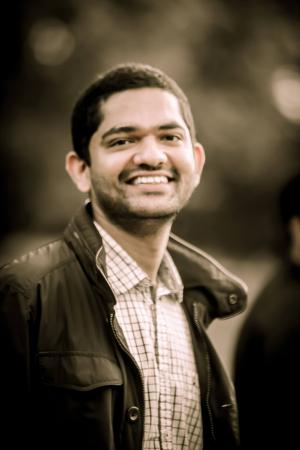
RESEARCH INTERESTS
Modern South Asia, British empire, global history, federalism, legal and constitutional history, postcolonial histories/subaltern studies, Indian princely states, history of Travancore/Kerala, decolonization, international law, self-determination, nationalism, and sovereignty
DISSERTATION
Federal Futures: Imagining Federation, Constitution, and World in Late Colonial India
Winner: The 200 Sardar Patel Award for the best dissertation on Modern India, given by UCLA.
BIOGRAPHY
Sarath Pillai is a Postdoctoral Research Fellow at the Center for the Advanced Study of India (CASI) at the University of Pennsylvania. He completed his Ph.D. in History with distinction from the University of Chicago in August 2022. He was a Fellow at the Hurst Institute in Legal History at the University of Wisconsin Law School in 2021. His Ph.D. dissertation, Federal Futures: Imagining Federation, Constitution, and World in Late Colonial India, studies the rise of federalist ideas in interwar India and their growing influence among various groups—nationalists, princes, liberals, and minorities—in the late 1920s through the 1940s. It presents an alternate genealogy of political thought, constitutionalism, and worldmaking in late colonial India by showing the deep fissures between those who wanted a unitary state (singular sovereignty) based on the British colonial state and those who wanted a federation (shared sovereignty) based on Euro-American constitutionalism. He draws on multi-lingual archives—marshaled through 18 months of archival research in three continents—to recover the underappreciated federalist imaginaries in late colonial South Asia.
He completed two major public history initiatives at the Historical Society of Pennsylvania as an intern in 2022-23. First, he wrote the first ever South Asia Subject guide for HSP, giving an overarching view of its South Asia collections from the 17th century to the present. Second, he inventoried the private papers of Harry Admason, a Philadelphia-based activist who was infected with HIV in 1982 and died in 2021. His papers are an unusual window to the world of gay rights, medical care, and the AIDS pandemic in Philadelphia. He was a Preceptor in the Master of Arts Program in the Social Sciences (MAPSS) for two years and served as the Student Ombudsperson for the University for two years. He has taught in several core sequences in the College of the University of Chicago: for a year in "Self, Culture, Society" (social science core focused on social theory) and for a quarter each in "Colonizations-II" and "Introduction to South Asian Civilizations-II." He has also taught modern South Asian history and European history at Hindu College and Indraprastha College for Women, both under the University of Delhi. He holds a Master of studies in law from Yale Law School, a Master of arts in history from the University of Delhi, and a postgraduate diploma in archives and records management from the National Archives of India, Delhi.
His research has been supported by American Historical Association, Center for International Social Science Research (CISSR), Social Sciences Research Center (SSRC), Committee on Southern Asian Studies (COSAS), Nicholson Center for British Studies, History Department (Kunstader travel grant), Oscar M. Ruebhausen Fund for Research at Yale Law School, Humboldt-Yale History Network Travel Grant, Florence Tan Moeson Fellowship at the Library of Congress, Harry S Truman Library and Princeton University Library.
PUBLICATIONS
Peer Reviewed
“German Lessons: Comparative Constitutionalism, State Rights, and Federalist Imaginaries in Interwar India.” Comparative Studies in Society and History (July 2023).
“Archiving Federally, Writing Regionally: Archival Practices and Princely State Histories in Postcolonial India,” Archives and Records, 42.2 (Oct 2021): 149-166.
"Fragmenting the Nation: Divisible Sovereignty and Travancore's Quest for Federal Independence." Law and History Review 34, no. 3 (Aug 2016): 743–82.
Book reviews
“The Politics of Democratic Planning in Postcolonial India,” review of Planning Democracy: How a Professor, an Institute, and an Idea Shaped India, by Nikhil Menon, Himal Southasian, April 25, 2023.
A Genealogy of Terrorism: Colonial Law and the Origins of an Idea,by Joseph McQuade, Global Nineteenth-Century Studies 1.2 (Dec 2022): 229–231.
“Politics, Law, and ‘Founding Moments’ in Late Colonial India,” review of Norms and Politics: Sir B. N. Rau in the Making of the Indian Constitution, by Arvind Elangovan, The New Rambler, Aug 24, 2022.
“Whither India? Princely States and the End of Empire,” review of Princestan, by Sandeep Bamzai, The Book Review 45.5 (May 2021): 06-08.
"Harshan Kumarasingham, A Political Legacy of the British Empire: Power and the Parliamentary System in Post-colonial India and Sri Lanka." South Asia Research 35, no. 2 (July 2015): 272–76.
"Caroline Keen, Princely India and the British: Political Development and the Operation of Empire." South Asia Research 34, no. 2 (July 2014): 183–86.
"Princely Modernity: A Mysorean Perspective," Economic and Political Weekly 48, no. 12 (Mar 23, 2013): 33–36.
Public writing and opinions (selected)
—Union Against Center: The Political Language of Federalism in India,” India in Transition Series, Center for the Advanced Study of India (CASI), University of Pennsylvania, Feb 27, 2023. (Republished in The Wire, The News Minute, and Scroll.in, and translated into Hindi, Bangla, and Tamil)
—“Amar Farooqui: A historian’s indelible legacy and lessons to last a lifetime,” Scroll.in, Dec 19, 2022.
—“How the princely states, used by Britain to consolidate its empire, faded into obscurity,” Scroll.in, Nov 24, 2022.
—“Archival Futures: The Archive as a Place and the Place of the Archive,” Los Angeles Review of Books, July 16, 2021.
—“Is this the right time for India to debate swapping its parliamentary system for a presidential one?” Scroll.in, Sept 13, 2020.
—“Kashmir and the Forgotten History of India’s Princely States,” The Diplomat, Aug 4, 2020.
—“Of Genealogy and Land Deeds: Some Thoughts on Family Histories in Kerala,” Ala: A Kerala Studies Blog, June 30, 2020.
—"Old Archival Laws, New Archives." Economic and Political Weekly 48, no.3 (Jan. 19, 2013): 20–22.
—"Archives and Archival Consciousness: A Postcolonial Predicament." Economic and Political Weekly 47, no. 22 (June 2, 2012): 32–34.
CURRENT POSITION
Postdoctoral Research Fellow, University of Pennsylvania
 THE UNIVERSITY OF CHICAGO
THE UNIVERSITY OF CHICAGO

